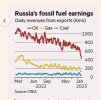WHile there is no way to verify claims of losses (for either side) and the daily movement of a relatively static battle line, one thing that can be quantified is the economic situation.
With no money, can't produce things and pay soldiers. This is battle of economies and seeing who outlasts who. At this point I can't bet on Russia being able to outlast EU countries which escaped a recession and have no dependency on Russian energy
News, analysis and comment from the Financial Times, the worldʼs leading global business publication

digitaledition.ft.com
Russian deficit hits $25bn
MAX SEDDON AND ANASTASIA STOGNEI
Moscow’s budget gap has soared as the Kremlin steps up defence spending while western sanctions begin to bite into oil and gas revenues.
Russia’s budget deficit hit Rbs1.76tn ($25bn) in January as the Kremlin stepped up defence spending and western sanctions began to hit the country’s oil and gas revenue.
The official figures are the latest sign of the damage the invasion of Ukraine continues to wreak on the economy nearly a year into President Vladimir Putin’s invasion of Ukraine.
Revenue from oil and gas fell 46 per cent year on year to Rbs426bn, the finance ministry said yesterday, blaming the drop on falling prices for Urals, its main crude export blend, and a decline in natural gas exports. Urals has traded at a significant discount to the global benchmark Brent product since the conflict began in late February 2022.
Expenditure ballooned by 59 per cent year on year to Rbs3.12tn in January 2023, amid largely classified plans to ramp up defence spending to Rbs3.5tn this year. Ukrainian officials have warned in recent days they believe Russia is set to launch a big offensive in the coming weeks to mark the first anniversary of the conflict.
Natalia Lavrova, chief economist at BCS Global Markets, the investment banking arm of the brokerage, said the figures marked the first time in its modern history that Russia had increased spending drastically at a time when revenues were falling sharply.
“The only time we saw something similar was in 2015, when spending on national defence increased sharply,” she said. “However, the huge difference between 2015 and 2023 is that, back then, the revenues dynamics was not as disastrous.”
The drop in oil and gas revenue was accompanied by a 28 per cent fall in other revenue to Rbs931bn, the finance ministry said, ascribing it to a decline in value added tax and corporate tax takings. The only similar decline in tax revenues on record was during the first wave of the Covid-19 pandemic in 2020, Lavrova said, when Russia imposed extensive lockdown measures.
“It is obvious that budgetary risks are increasing: both on the spending and revenue sides,” Lavrova added.
Moscow, which typically derives up to half of its revenues from oil and gas, offset the blow to its economy from western sanctions through increased volumes of discounted energy sales to countries such as China and India amid record energy prices last year.
But Putin’s “economic mobilisation” drive to support the war effort has driven up spending, while the sanctions have pushed Russia to sell Urals at an average price of $49.48 a barrel last month, a 41 per cent drop year on year and well below of the $70-a-barrel level assumed in Russia’s budget.
The ongoing hit to Russia’s coffers has prompted the finance ministry to look for ways to compensate for the widening deficit. Russia sold Rbs38.5bn of Chinese yuan and gold from its rainy-day National Welfare Fund last month and plans to issue Rbs800bn in local bonds in the first quarter of 2023 as part of a move to raise this year’s domestic borrowing to Rbs2.5tn, from a previously planned Rbs1.7tn.










